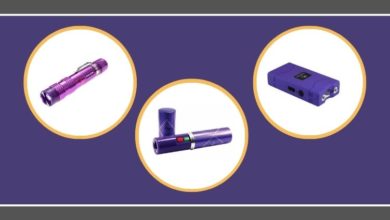How Bad Does Pepper Spray Hurt: Understanding The Impact And Effects
KEY TAKEAWAYS
Pepper spray, also known as OC spray (oleoresin capsicum), is a popular self-defense tool used by individuals to protect themselves in dangerous situations. It is widely used by law enforcement agencies, security personnel, and civilians alike.
While pepper spray can be an effective means of disabling an assailant temporarily, many people wonder, “How bad does pepper spray hurt?” In this comprehensive guide, we will delve into the topic of pepper spray’s impact and effects, exploring the pain it causes, the physiological response it triggers, and the after-effects that follow its use.
How Bad Does Pepper Spray Hurt?
Pepper spray is specifically designed to cause extreme discomfort and pain to its target. When exposed to pepper spray, individuals experience an intense burning sensation in the eyes, nose, throat, and skin.
This excruciating pain can be debilitating, causing temporary blindness, difficulty breathing, and disorientation. The severity of the pain varies depending on the concentration of the spray, the distance from which it is deployed, and the individual’s tolerance level.
The Physiological Response to Pepper Spray
When pepper spray comes into contact with the eyes and skin, it activates the sensory nerve receptors, leading to an immediate physiological response. The active ingredient in pepper spray, capsaicin, binds to the pain receptors, triggering a cascade of reactions.
As a result, the eyes begin to tear profusely, the blood vessels in the eyes and skin dilate, and inflammation occurs. This combination of reactions intensifies the pain experienced by the affected individual.
Factors Affecting the Intensity of Pepper Spray’s Impact
Several factors contribute to the intensity of pepper spray’s impact on an individual. These include:
Concentration of Capsaicin
Pepper spray is available in various concentrations, typically measured in Scoville Heat Units (SHUs). The higher the concentration of capsaicin, the more potent the spray. Law enforcement-grade pepper sprays often have a higher capsaicin concentration than civilian variants, resulting in a more intense and longer-lasting effect.
Distance from the Spray
The distance from which the pepper spray is deployed also affects its impact. When sprayed at close range, the concentration of capsaicin particles is higher, leading to a more immediate and severe reaction. Conversely, if the spray is released from a distance, the capsaicin particles disperse, reducing the intensity of the impact.
Duration of Exposure
The length of time an individual is exposed to pepper spray plays a role in determining the extent of the pain experienced. A brief exposure may cause discomfort and irritation, while a prolonged exposure can result in severe pain and prolonged effects.
Individual Tolerance
Each person’s tolerance to pepper spray varies. Factors such as overall health, previous exposure to capsaicin, and individual pain threshold influence the perceived pain level. Some individuals may experience more intense pain due to heightened sensitivity, while others may exhibit a higher tolerance and withstand the effects better.
FAQs
1. Is pepper spray dangerous?
Pepper spray, when used properly and responsibly, is generally considered safe. However, improper use or using pepper spray with excessive force can lead to complications and risks. It is essential to follow the instructions provided with the spray and exercise caution when deploying it.
2. Can pepper spray cause permanent damage?
In most cases, pepper spray does not cause permanent damage. However, it can temporarily impair vision, cause respiratory distress, and induce intense pain. These effects typically subside within a few hours, but individuals with pre-existing eye conditions or respiratory problems should exercise caution.
3. How long does the pain from pepper spray last?
The pain from pepper spray usually lasts anywhere from 30 minutes to an hour. However, residual effects such as redness, swelling, and irritation may persist for several hours. Immediate rinsing with water and applying soothing agents can help alleviate the discomfort.
4. What should I do if I am sprayed with pepper spray?
If you are sprayed with pepper spray, move to an area with fresh air and flush your eyes and skin with water for at least 15 minutes. Avoid rubbing your eyes, as it can further spread the capsaicin. Seek medical attention if you experience severe or prolonged symptoms.
5. Can pepper spray be used as a self-defense tool?
Yes, pepper spray is commonly used as a non-lethal self-defense tool. It can incapacitate an attacker temporarily, providing an opportunity to escape or seek help. However, it is crucial to familiarize yourself with local laws and regulations regarding the use of pepper spray.
Conclusion
Pepper spray is a powerful self-defense tool that can immobilize an assailant temporarily. The intense pain it causes, coupled with the physiological response it triggers, makes it an effective means of deterring and disorienting attackers.
However, it is essential to use pepper spray responsibly and understand its potential impact on both the assailant and the user. By familiarizing yourself with the effects and proper usage guidelines, you can harness the power of pepper spray for personal safety.
Want to find better ways to protect yourself from dog attacks? Check out the best stun guns for dogs from our blogs at Security Forward.




